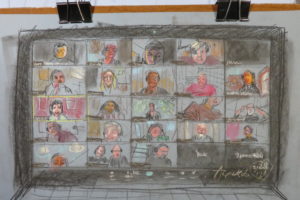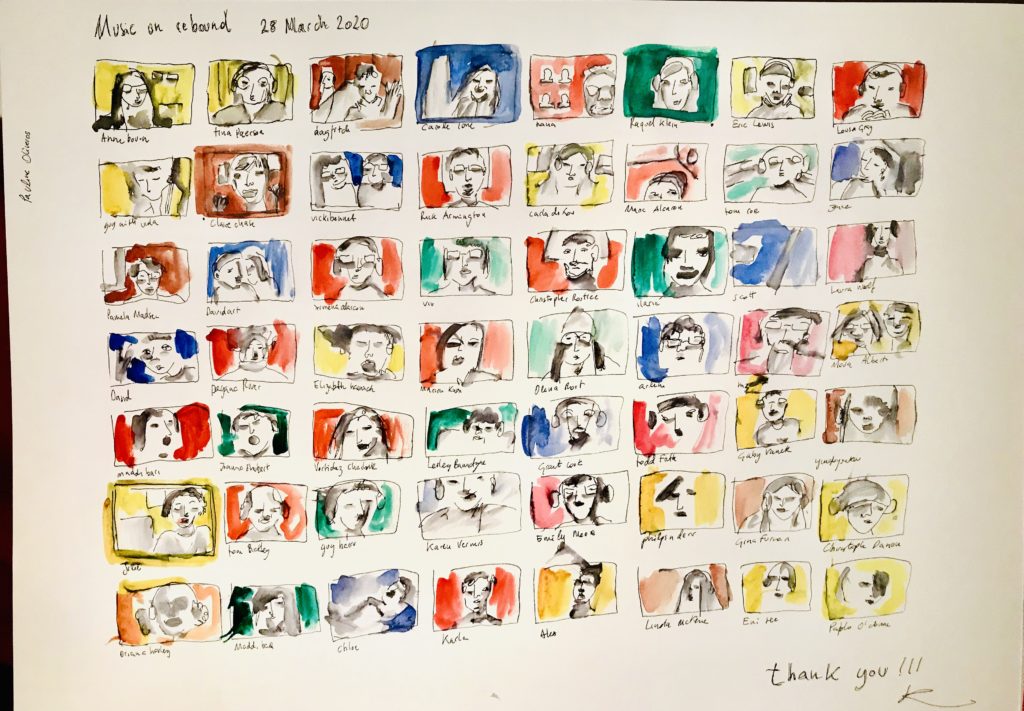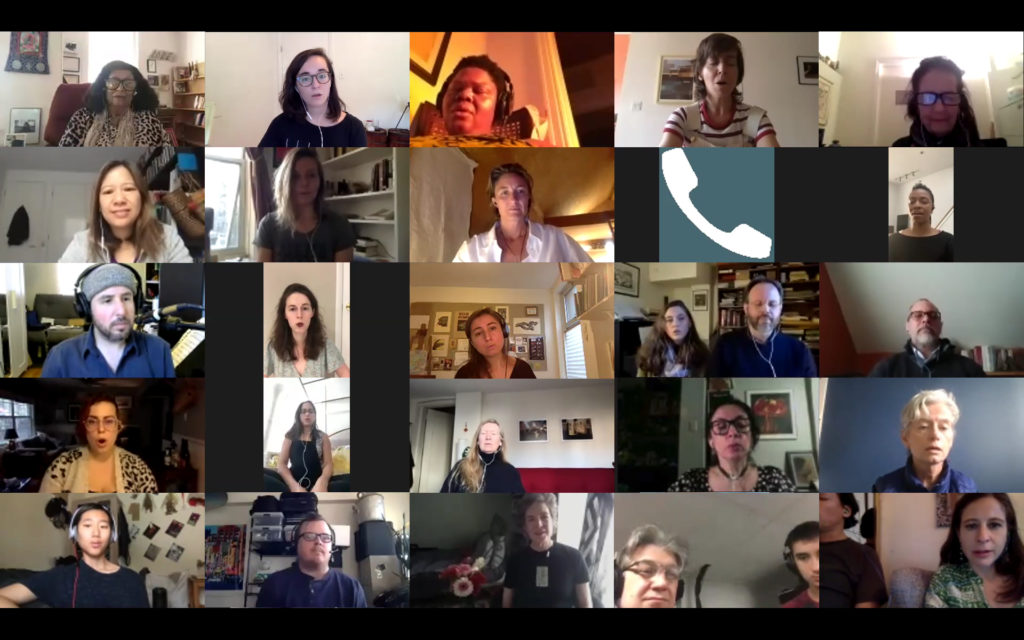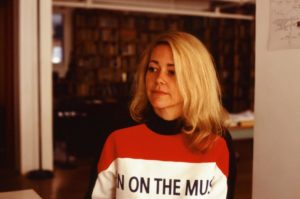
Q & A: Raquel Acevedo Klein, Ione, & Claire Chase On the Virtual Performance of Pauline Oliveros’s ‘The World Wide Tuning Meditation’
By Jennifer PyronA growing number of participants are joining an online Zoom performance of Pauline Oliveros’s “The World Wide Tuning Meditation” each Saturday. Together, Raquel Klein of Music on the Rebound, Ione, Claire Chase, International Contemporary Ensemble, and other passionate co-coordinators invite anyone curious to embark on the art of virtually discovering a special connection during the COVID-19 crisis.
Composer Pauline Oliveros, who died in 2016, may best be known for her sensory focused compositions and “deep-listening” driven ideals. As both a pioneer and futurist, her work embodies an other-worldly understanding of creativity that continues to challenge the norm. Now, more than ever, with a weekly performance of “The World Wide Tuning Meditation,” even her simplest idea of bringing voices together, proves to be the right piece for a virtual performance.
To better understand the inception and process of a virtual performance platform featuring Pauline Oliveros’s “The World Wide Tuning Meditation,” OperaWire recently spoke with Raquel Klein, Claire Chase, and Oliveros’s widow, Ione, to learn more.
OperaWire: How did the vision for an online meditation based performance first take root? Can you tell me about the initial creative process?
Raquel Klein: It was almost a month ago, that I wanted to organize a festival in response to the COVID-19 crisis. I felt I had to create a way for people to come together. The first piece of this vision that came to mind for me was asking the question of what if we used the means of sound to connect? I believe that music is an ally we use to connect.
“The World Wide Tuning Meditation,” by Pauline Oliveros is a perfect piece of music where anyone can participate. This piece is deeply rooted in its participants and hones in on everyone being together through sound. It focuses on resonance and all these wonderful things that make people feel closer. I emailed Claire Chase and told her how I felt this festival should be centered around an idea of bringing everyone together through music and through sound. Her immediate response was, “YES. We have to do this.”
Claire Chase: When I received Raquel’s email I was very moved, impressed and inspired. Raquel was one of the first artistic responders. Her generous and luminous email with information about a festival she had just dreamed up and then actualized in record time was an extraordinary response to the crisis. I remembered how E. E. Cummings said, “I imagine that yes is the only living thing,” and that’s when I knew the only response to Raquel’s idea was YES, a thousand times. That’s also when I suggested to Raquel that we go to the source. If we were going to do this right, then this was the moment to go to one of the most extraordinary human beings that is with us right now, Ione.
Ione: For me, hearing about this idea was so exciting and it felt so right. I was sort of plunged into this world of Raquel, which is this magical world of creating and can-do that I absolutely love and Pauline would have loved as well. I was extremely moved because Pauline and I, for many years, from the inception of the first time we met in 1985, had envisioned a global network of artists really interconnected in certain ways.
Years later, after we met, Pauline created “The World Wide Tuning Meditation” and it is something we had done together as a force, involving many countries, at Lincoln Center Plaza. The last time Pauline performed this piece was in London, England on the eve of Brexit. It was a very powerful and political moment for the world, one we are still dealing with. At that time 500 voices were in an amazing cathedral. It was such solace for everyone. Pauline and I had always spoken about doing it again and planned on doing it bigger. Of course as a technology person, at the forefront of futurists, she would immediately understand and know that this is it. So when I was contacted about performing it now, I knew it would be the perfect time. This is all that Pauline intended ‘The World Wide Tuning Meditation’ to be and it is happening with all of these amazing people and voices all over the world on this expansive level, which is so Pauline. This group is a medicine, a “medicine machine.”
CC: Yes, a “medicine machine” that is intergenerational. I think about all of these soldiers on the ground that are visionaries as artists, organizers and organizational partners such as the International Contemporary Ensemble, and each of us that are functioning together to create a collaborative effort across various ages, timezones, and sort of multi-species conviviality, one could say.
IONE: Well, I have the kitties here with me now and they are helping.
CC: The kitties, yes. During these Zoom meetings we have these animals that join us. Some people even have their dogs on the screen. Everything that happens, even a technological glitch, is welcomed into the creative space. This is also the generosity of Pauline’s vision. She wrote throughout her life about how in the 21st century we would be grabbling with who we are as extended human beings. She was talking about artificial intelligence long before it was a house-hold term.
Pauline asked questions about what a hybrid computer and human form of music making, consciousness and responsibility would look like in the 21st century. While we are not dealing with artificial intelligence on these Zoom calls, the question of how we show up in mutuality and how we are attending in these new forms that are both technological and bodily, make it a very rich space of discovery and constant failure as it goes with improvisation. All of this creates an enormous trust that is placed in one another across multiple distances every Saturday and I kind of want to do it every Saturday for the rest of my life.

OW: What can you tell OW readers about the benefits a singer might experience while practicing deep listening, especially if one has not participated in improvisation or deep listening before?
IONE: Pauline’s practice of deep listening came from her concept of decision to listen as much as possible to every single thing that she could hear and to open herself to that form of listening. She felt that listening was very close to the concept of consciousness itself. She was always exploring consciousness because scientists were trying to figure it all out and she felt that listening and sound were actually at the crux of that discovery. Listening simply means being present to all of the sounds around us. Listening is a simple practice.
One doesn’t have to be a singer or a musician to benefit from listening and I feel that it’s so simple to connect to the steps of ‘pausing, stopping, breathing, noticing, and listening’ and not tuning out things that one often tunes out and then thinking that this tuning out will help in some way. Because it doesn’t. Being inclusive and also learning about being exclusive in a sense of focal sounds is the idea. Pauline’s method shows us a circle with a dot in the middle. Focusing our attention on that point of sound allows us to then notice what is around that point. Like for example, I am hearing the sound of my voice and around this sound I am hearing the possible noise of trucks outside my window. This is an example of a simple practice of deep listening that enhances all kinds of relationships.
CC: I love how Pauline would say that babies are the best listeners. Babies are the best breathers. I’m not a singer myself but as a flute player I go through a lot of the same exercises and the same existential crises that singers do because my instrument is played with breath. One exercise I do takes place on the floor or up against a wall to try to feel my body in its most natural way, the way that a baby feels its breath and listens with its entire body.
I believe that the spaces in which we listen are as important as the sounds we make in them. We can think about space as a cathedral or cistern with its 45 second reverb, but that space can also be our own body. I think this a really interesting, instructive and inquisitive way to understand our responsibility as music makers, especially when our primary instrument is our breath. “The World Wide Tuning Meditation,” is defined not so much by the tones that we sing but by the way we are able to hear and imagine one another’s tone in time and space. I imagine this to be good for vocal technique, too.
RK: On a personal note from both the vocal perspective and the conductor perspective, while engaging with Pauline’s works I would start my rehearsals. For example, with the Brooklyn Youth Orchestra I would engage young singers in deep listening and described this technique by relating to an article that I read a long time ago on Helen Keller. In this article, Helen Keller made the statement that if she had the use of vision for three days, she would memorize every single contour in front of her. She would take note of all her surroundings in ways that this with sight might take for granted. The beauty in every single detail. As artists and practitioners of music it is important to respond to these details.
What’s wonderful about Pauline’s practice and the reason why I am so grateful to be able to interact with it is that when one takes the moment to engage with the details, one develops a relationship to sound that translates into the performance itself. One creates a palate for singing that transcends this idea of singing softly or singing loudly. One engages with the act of responding to the material in a transcendental way. I find that when I’m working on an opera score I am always engaging with different moments and I’m also responding to who I may be in dialogue with and there are so many ways to interpret sound in any moment. This also translates through the technology and working with the limitations of Zoom. It’s important for vocalists to work with what we have and I think Pauline’s work and deep listening is an enriching ally.
OW: What hopes and visions do you have for the continued expansion of the online artist community and live performance community? What do you want to see further developed as a result of this current project?
CC: Well, I think we are discovering this now because I certainly don’t know yet. I’m taking a measured approach of all the projects that I’m undertaking at this time and being improvisatory by living and managing the present moment. I am being humble about what we don’t know in three to four weeks from now. As musicians I think it is our responsibility to respond. Our ability to respond is our spiritual calling and out ethical calling. Projecting into the future right now feels arrogant. I don’t know what the world will need in three to four weeks from now and I don’t know what form this kind of gathering will need to take. What I do know is that I want to be responsive to it and open to what those needs are as they arise and I’m very grateful to get to do this in an intergenerational community.
RK: I think that based on “The Tuning Meditation” itself, it has been this eye into the world that lets us see what we as humans need at this time. Music is this tangible connector for all of us. What I’ve been observing both within myself and amongst other people is that we have this wonderful opportunity to engage with each other from all over the world in ways that we might not otherwise have been as hungry for before now.
The hunger that people find while connecting through music is the most exciting thing for me to see. This hunger makes me want to better understand how we can invent ways for people to truly engage. We have so many streaming platforms for music, but I think right now there is this human need of really connecting with each other. As Claire, Ione, International Contemporary Ensemble, and myself have started to interpret what’s going on and responding to everything, we’ve realized this idea of honing into the human aspect is vitally necessary. The real time about now is when we’re all together in a spiritual space.
The Zoom call chat window, where anybody is invited to say hello, is one of my favorite parts. In the last session, as people were saying hello from all over like Germany, Switzerland, Greece, Turkey, and countries within Africa, one could see ‘hello’ being interpreted in many different languages. Someone added in the chat how seeing everyone coming together brought them to tears. The sight and the sound of this overwhelming amount of camaraderie has yet to take shape and I don’t know what it will take the shape of in the future. I think that what I find most moving is the creative hunger and it is this hunger that I want to respond to the most. Together, we will find ways in which we can continue through the music and through these observations.
IONE: I think what’s been mentioned is that being responsive to the moment, as Claire and Raquel are saying, is extremely important. It is the crux and the core of improvisation. It is the crux and the core of being present in the world. It is something that can lead to what I consider as part of the Divine. Creativity is our deepest connection to the Divine. The responsive element to what we notice happening is a dance. We are dancing during this time and with all there is. I feel that it’s extremely important for many people who may not understand this, to be given the opportunity to get it. I believe all of this will lead into advances in technology that are already present but not much used. One idea being the use of holographic images. I have been predicting holograms for forty years, or so. I think this could be the moment where some people think well, let’s see if this can work. It means we could be closer to the physical form in some ways and the technology is already there for us to use it. It has not been democratized but it could happen. We will see. It’s a dance.
OW: Ione, do you hope to see a greater world-wide expansion of music integrated with technology in a humanly relatable way? Do you think that it’s possible to integrate this online expansion that is happening now with live performances?
IONE: Yes, it has already been done. People are exploring it, as I said. It could be with this thrust of general humanity involved where it becomes a little more interesting financially and new possibilities arise. Yes, for sure. Anything I’ve ever written has also involved the holographic presence and I would love to continue with that.




